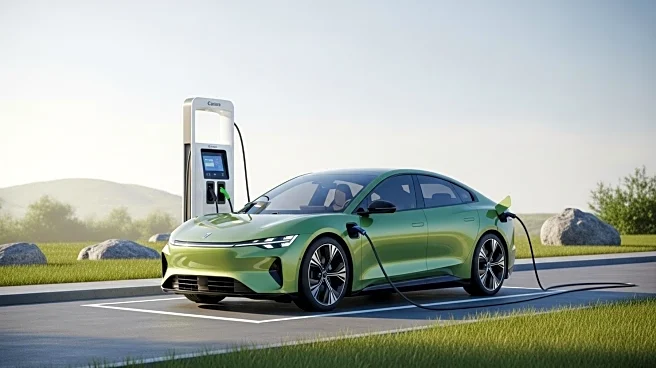What is the story about?
What's Happening?
Mazda Motor Corporation has announced an updated roadmap to achieve carbon neutrality at its global manufacturing facilities by 2035. The company has set an interim target for the fiscal year 2030, focusing on its domestic plants and offices, which contribute to approximately 75% of its carbon dioxide emissions. The updated plan includes transitioning from coal to a gas cogeneration system fueled by city gas produced from LNG at its Hiroshima Plant. This system will allow Mazda to gradually shift to hydrogen, a carbon-neutral fuel, with minimal equipment changes. The company aims to decommission its coal-fired power plants at the Hiroshima and Hofu sites by around 2030. Mazda is collaborating with Kawasaki Heavy Industries to optimize the gas cogeneration system for high energy efficiency. The interim CO2 emissions reduction target for 2030 has been revised to 46% or more, aligning with Japan's national target.
Why It's Important?
Mazda's updated roadmap is significant as it aligns with global efforts to reduce carbon emissions and combat climate change. By transitioning to cleaner energy sources and setting ambitious targets, Mazda is contributing to the automotive industry's shift towards sustainability. This move could influence other manufacturers to adopt similar strategies, potentially accelerating the industry's overall progress towards carbon neutrality. The collaboration with local energy providers and Kawasaki Heavy Industries highlights the importance of partnerships in achieving environmental goals. Mazda's commitment to reducing emissions not only supports environmental sustainability but also positions the company as a leader in the transition to a low-carbon economy, which could enhance its brand reputation and competitiveness in the market.
What's Next?
Mazda plans to continue its efforts towards carbon neutrality by engaging in co-creation with partners to refine the gas cogeneration system and explore further energy-saving initiatives. The company will work closely with local energy providers to ensure a stable energy supply while promoting CO2 reduction. As Mazda progresses towards its 2035 goal, it will likely face challenges related to technological advancements and the availability of alternative fuels. The company's ability to adapt to these changes will be crucial in meeting its targets. Stakeholders, including environmental groups and industry peers, will be watching Mazda's progress closely, as it could set a precedent for other manufacturers.
Beyond the Headlines
Mazda's roadmap update reflects a broader trend in the automotive industry towards sustainability and environmental responsibility. The shift from coal to cleaner energy sources like LNG and hydrogen is part of a larger movement to reduce reliance on fossil fuels. This transition may also have economic implications, as it could lead to changes in energy markets and influence the development of new technologies. Additionally, Mazda's focus on collaboration with local communities and partners underscores the importance of collective action in addressing climate change. The company's efforts could inspire similar initiatives across other industries, contributing to a more sustainable future.
















